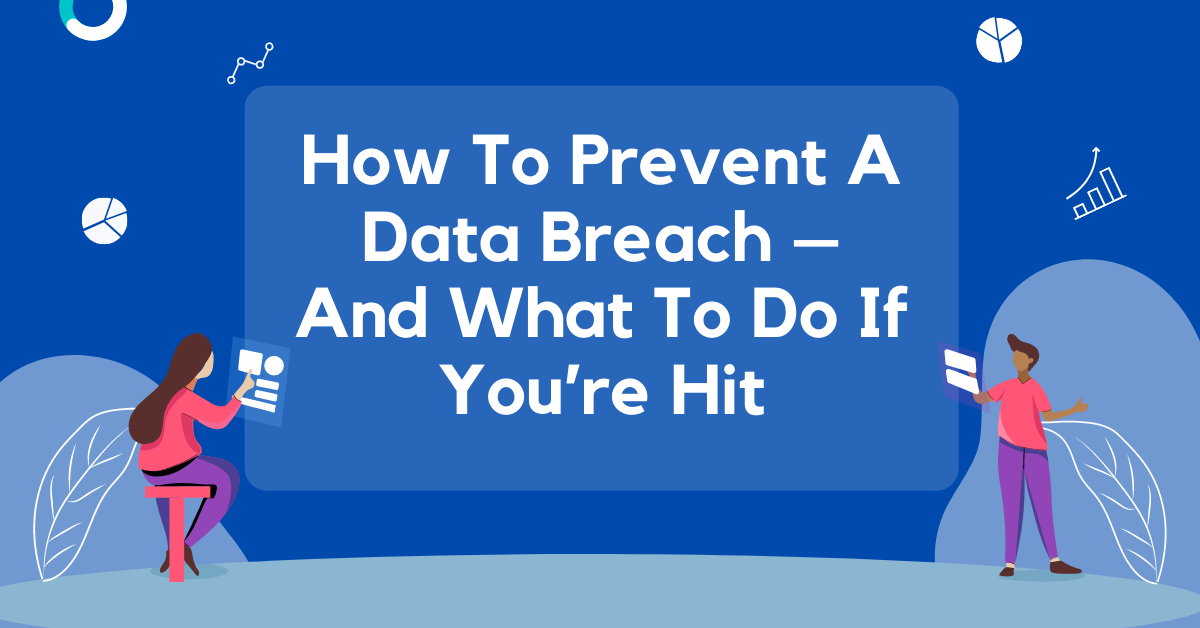In this blog post, we’ll explain how you can prevent a data breach, and what you should do if you’re hit by one. Keep reading to find out.
According to the government’s Cyber Security Breaches Survey 2021, a huge 39% of businesses and 26% of charities experienced a cyber security breach in the previous year. This rose to 65% of medium-sized businesses, 64% of large companies, and 51% of charities with high rates of income.
These statistics certainly are sobering, but to protect organizational and customer data, we need to know more. In this article, learn what data breaches are, what steps to take if your organization is hit by one, and how you can prevent the issue from happening going forward.
Before I show you how to prevent a data breach, let me answer the basic question – what is a data breach?
Table of Contents
What Is A Data Breach?
The European Commission, from which we get the influential GDPR data rules, classifies a data breach as a security incident that results in data confidentiality, availability, or integrity.
That means that if the private data of your customers, business, or any other party that you hold is shared, lost, accessed, or altered in some way, then you have suffered a data breach.
What To Do If You Experience A Data Breach?
If you experience a data breach, the first thing you need to do is contact the supervisory authority within 72 hours of the breach taking place. In the UK, you will typically need to get in touch with the Information Commissioner’s Office.
If the data breach is likely to impact the rights and freedoms of the affected individuals, then you must notify them immediately too. From there, you need to record the breach, as the ICO may investigate. If you don’t have the right records, you could be hit by fines.
Since there are clear legal ramifications that result from being exposed to a data breach, it’s important that you get the legal representation that specializes in the field of data and technology. While you may understand some facets of the process, having an expert on your side can make the process much quicker, simpler, and more likely to conclude satisfactorily.
READ ALSO: How To Patiently Read Terms And Conditions Agreement
How To Prevent Data Protection Breaches
The best way to prevent data breaches from happening is to first adopt the mindset that one is almost certain to happen. That way, you can move forward and take a proactive approach.
This involves creating data breach detection systems, investigation processes, and reporting methods that allow you to identify data breaches, understand them, and combat them in line with the law.
Transparency is crucial at every stage. Covering up data breaches is a criminal offence, so you need to create a culture in which staff feels comfortable reporting breaches and have the means to easily do so.
Hopefully, your business never experiences a data breach, but if it does, there are plenty of things you can and must do to make sure the worst doesn’t happen again and data privacy isn’t infringed upon.
How To Prevent A Data Breach – And What To Do If You’re Hit: FAQs
How can data breaches be prevented?
There’s no foolproof way to prevent a data breach entirely, but you can significantly reduce the risk by following best practices like:
- Using strong, unique passwords and enabling multi-factor authentication (MFA).
- Keeping software and operating systems updated with the latest security patches.
- Being cautious about emails and attachments, especially those from unknown senders.
- Having a data security plan and employee training on cybersecurity awareness.
What is the first step you should take if you suspect a data breach?
If you suspect a breach, immediately change your passwords for the affected accounts and any other accounts where you might be using the same password.
READ ALSO: Can VPNs Help Prevent Cyberattacks? [We Have The Answer]
What are the 5 steps of data breach response?
There isn’t a universally agreed-upon 5-step process, but a general approach might involve:
1. Identifying and containing the breach: Stop the attackers from gaining further access.
2. Assessing the impact: Determine what data was compromised and who was affected.
3. Notifying authorities and individuals: Report the breach to relevant authorities and inform affected individuals.
4. Taking steps to prevent future breaches: Improve security measures to reduce the risk of future attacks.
5. Monitoring and remediation: Continuously monitor for suspicious activity and take steps to fix any vulnerabilities.
What should I do if I am aware of a data breach?
If you’re informed of a data breach that affects you, change your passwords and consider enabling account monitoring or fraud protection services (if offered). Stay vigilant for suspicious activity related to your accounts.
What should you do immediately after a data breach?
The most immediate action is changing passwords for the affected accounts and any others at risk. Monitor your accounts for suspicious activity and consider placing a temporary hold on your credit card if financial information might have been compromised.
How do I protect my data after a breach?
Following a breach, be cautious about phishing attempts that might try to capitalize on the situation. Stay informed by following updates from the organization that experienced the breach about what steps they are taking and what you should do.
INTERESTING POSTS
- How To Prepare Your Business For Data Loss
- 12 Worst Data Breaches In History
- When Is Hacking Illegal And Legal? [Honest Answer]
- How To Be The Number One Hacker In The World
- The Increasing Importance Of Cybersecurity
- Ultimate List Of The Best Antivirus Blogs [MUST READ]
- 16 Best Protection Tools Against Hackers [100% WORKING]
About the Author:
Gina Lynch is a VPN expert and online privacy advocate who stands for the right to online freedom. She is highly knowledgeable in the field of cybersecurity, with years of experience in researching and writing about the topic. Gina is a strong advocate of digital privacy and strives to educate the public on the importance of keeping their data secure and private. She has become a trusted expert in the field and continues to share her knowledge and advice to help others protect their online identities.
Meet Angela Daniel, an esteemed cybersecurity expert and the Associate Editor at SecureBlitz. With a profound understanding of the digital security landscape, Angela is dedicated to sharing her wealth of knowledge with readers. Her insightful articles delve into the intricacies of cybersecurity, offering a beacon of understanding in the ever-evolving realm of online safety.
Angela's expertise is grounded in a passion for staying at the forefront of emerging threats and protective measures. Her commitment to empowering individuals and organizations with the tools and insights to safeguard their digital presence is unwavering.







